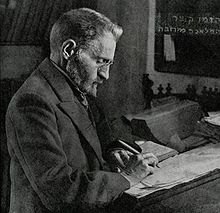Eliezer Ben-Yehuda
- For the street named for Eliezer Ben Yehuda in Jerusalem, Israel, see Ben Yehuda Street.
Eliezer Ben-Yehuda | |
|---|---|
 | |
| Born | January 7, 1858 |
| Died | December 16, 1922 (Age 64) |
| Known for | Revival of spoken Hebrew |
Eliezer Ben‑Yehuda (Template:Lang-he-n, 7 January 1858–16 December 1922) was a key figure in the revival of Hebrew as a spoken language. Ben-Yehuda regarded Hebrew and Zionism as symbiotic: "The Hebrew language can live only if we revive the nation and return it to the fatherland," he wrote. [1]
Biography
Eliezer Ben-Yehuda was born Eliezer Yitzhak Perlman, in Luzhky, Vilna Governorate of the Russian Empire (now Vitsebsk Voblast, Belarus). He attended heder where he studied Hebrew and the Bible from the age of three, as was customary among the Jews of Eastern Europe. By the age of twelve he had been studying in Hebrew for nine years and had read large portions of the Torah, Mishna, and Talmud. His parents hoped he would become a rabbi, and sent him to a yeshiva. There, he continued to study ancient Hebrew and was also exposed to the Hebrew of the enlightenment, including secular writings. Later, he learned French, German, and Russian, and was sent to Dünaburg for more education. Reading the Hebrew language newspaper HaShahar, he became acquainted with Zionism and concluded that the revival of Hebrew language in the Land of Israel could unite all Jews worldwide.
Ben Yehuda was married twice, to two sisters. His first wife, Devora (nee Jonas), died in 1891 of tuberculosis, leaving him with five small children. Soon after his wife's death, three of his children died of diphtheria within a period of 10 days. Six months later he married Devora's younger sister, Paula Beila,[2] who took the Hebrew name "Hemda".[3] His wife Devora's final wish was that he should marry Paula.
Study in Paris
Upon graduation he went to Paris to study at the Sorbonne University. Among the subjects he studied there were history and politics of the Middle East, but the one that had the most lasting effect was Hebrew - specifically, his advanced Hebrew classes taught in Hebrew. It was this use of Hebrew in a spoken form that convinced him fully that the revival of Hebrew as the language of a nation was practical. Ben-Yehuda spent four years in Paris.[2]
Move to Jerusalem
Before Ben‑Yehuda... Jews could speak Hebrew; after him, they did.
— Cecil Roth, Was Hebrew Ever A Dead Language?
In 1881 Ben-Yehuda traveled to Palestine, then a province of the Ottoman Empire. He found a job teaching at the Alliance Israelite Universelle school. [4]Motivated by the surrounding ideals of renovation and rejection of the diaspora lifestyle, Ben‑Yehuda set out to develop a new language that could replace Yiddish and other regional dialects as a means of everyday communication between Jews who made aliyah from various regions of the world.

Ben‑Yehuda raised his son, Ben‑Zion Ben‑Yehuda (the first name meaning "son of Zion"), entirely through Hebrew. He refused to let his son be exposed to other languages during childhood. It is said he once reprimanded his wife, after he caught her singing a Russian lullaby to the child. His son was the first native speaker of modern Hebrew; his autobiography, written under the pen name Itamar Ben‑Avi (איתמר בן אב"י, "Itamar, son of Avi", Avi is an abbreviation created from the three first letters of the name Eliezer Ben Yehuda), is still widely read in Israel.
Journalistic career
Ben-Yehuda was the editor of several Hebrew-language newspapers: HaZvi, Hashkafa and HaOr. HaZvi was closed down for a year in the wake of opposition from Jerusalem's ultra-Orthodox community, which fiercely objected to the use of Hebrew, the holy tongue, for everyday conversation.[2]
Lexicography
Ben-Yehuda was the driving spirit behind the establishment of the Committee of the Hebrew Language, later the Academy of the Hebrew Language, an organization that still exists today. He was the author of the first modern Hebrew dictionary and became known as the "reviver" of the Hebrew language, despite opposition to some of the words he coined.[2] Many of these words have become part and parcel of the language but others - some 2,000 words - never caught on. His word for "tomato," for instance, was badura, but Hebrew speakers today use the word agvania. [5]
Death
In December 1922, Ben Yehuda, 64, died of tuberculosis, from which he suffered most of his life. He was buried on the Mount of Olives in Jerusalem.[6] His funeral was attended by 30,000 people.[7]
See also
References
- ^ http://www.haaretz.com/hasen/spages/1040214.html, Confessions of a polyglot
- ^ a b c d Naor, Mordechai. "Flesh-and-Blood Prophet". Haaretz. Retrieved 2008-10-01.
- ^ Eliezer Ben-Yehuda (1858-1922)
- ^ http://www.haaretz.com/hasen/spages/1040214.html, Confessions of a polyglot
- ^ http://www.haaretz.com/hasen/spages/1040214.html
- ^ Mount of Olives - Jerusalem
- ^ http://www.haaretz.com/hasen/spages/1040214.html, Confessions of a polyglot
Bibliography
- Fellman, Jack (1973). The revival of a classical tongue: Eliezer Ben Yehuda and the modern Hebrew language. The Hague, Netherlands: Mouton ISBN 90-279-2495-3
- Robert St. John. Tongue of the Prophets, Doubleday & Company, Inc. Garden City, New York, 1952. ISBN 0-8371-2631-2
- Yosef Lang. The Life of Eliezer Ben Yehuda. Yad Yitzhak Ben Zvi, 2 volumes, (Hebrew)
- Ilan Stavans, Resurrecting Hebrew (2008)[1]
- ^ http://www.haaretz.com/hasen/spages/1040214.html, Confessions of a polyglot
